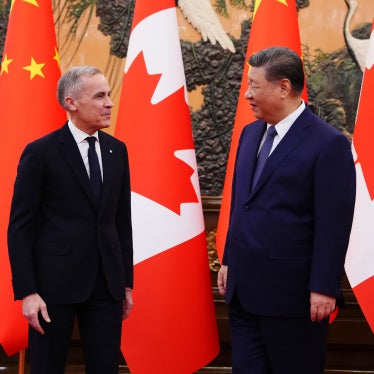(Washington, DC) – Peru should conduct a prompt, thorough, and impartial investigation into the killing of 6 civilians during a confrontation with the police in Chala, Human Rights Watch said today.
On April 4, 2010, approximately 200 members of the police tried to disperse a demonstration of at least 6,000 miners, who had closed a major highway in Chala, in Caravelí province, according to local press reports. The reports said that demonstrators threw stones and sticks at the police, and the police used tear gas and opened live fire to disperse the demonstration. According to the local press reports and non-governmental organizations, the police gunfire killed five demonstrators and wounded about 30 others. A woman who was not participating in the events reportedly died of a heart attack.
“An independent and impartial investigation is absolutely critical to ensure that those responsible for these killings are brought to justice,” said José Miguel Vivanco, Americas director at Human Rights Watch.
The demonstrators were calling for the repeal of a presidential decree issued in February that aimed at regulating illegal mining in Madre de Dios.
Local press reported that on the evening of April 5, demonstrators agreed to end the blockade and to allow vehicles to go by for two hours in exchange for the release of 28 demonstrators who had been detained after the confrontation. Only one demonstrator, who allegedly had explosives, remained in detention.
Several government officials said publicly that the Peruvian government declared a state of emergency in the region on April 1 and suspended certain rights in the expectation of protests over the mining decree. Victor García Toma, Peru’s minister of justice, said in a televised interview that the demonstration in Chala was a “delinquent act” that was “totally unreasonable” and “has no legal support.”
“If the government expected demonstrations, it should have issued clear instructions to security forces that efforts to restore order must be consistent with international human rights standards,” Vivanco said. “Using lethal force to disperse a demonstration is not permitted simply by declaring a state of emergency. Any use of force must be absolutely necessary and strictly proportionate, even in states of emergency.”
The International Covenant on Civil and Political Rights, ratified by Peru in April 1978, and the American Convention on Human Rights, ratified by Peru in July 1978, state that the right to life is non-derogable during states of emergency. The UN Principles on the Effective Prevention and Investigation of Extra-Legal, Arbitrary, and Summary Executions also make clear that “exceptional circumstances including a state of war or threat of war, internal political instability or any other public emergency may not be invoked as a justification of such executions. Such executions shall not be carried out under any circumstances including, but not limited to … excessive or illegal use of force by a public official…”
The United Nations Basic Principles on the Use of Force and Firearms by Law Enforcement Officials provides that law enforcement officials, in carrying out their duty, shall, as far as possible, apply non-violent means before resorting to the use of force and firearms. Whenever the lawful use of force and firearms is unavoidable, law enforcement officials shall use restraint and act in proportion to the seriousness of the offence. The legitimate objective should be achieved with minimal damage and injury, and preservation of human life respected.








